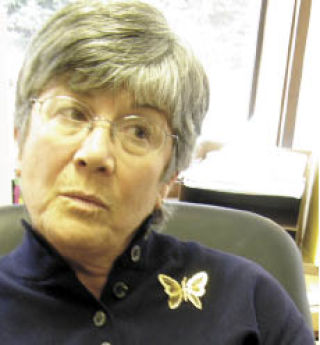When Thel Harbin lost her beloved husband to leukemia in 2004 three years after his terminal diagnosis, she assured herself she had time to prepare for his death, that she could get through the pain.
For a time she seemed to be doing fine. But after a New Year’s eve out with friends, she returned to her lonely home in the country – and fell apart.
At work, at home and everywhere, the tears poured out.
“I thought I was going absolutely insane,” Harbin said.
One day a friend told Thel about an organization called Griefworks that helps people work through the loss of loved ones. And it was there, in the company of others who had suffered what she had that real healing began.
Since 1998, when program director Mel Erickson and former executive director Nanette Flynn founded the non-profit agency to help people in King and Pierce counties work through the pain of losing loved ones, Griefworks has lent its supportive arm to more than 10,000 people.
People like Harbin, who told her story at Griefworks annual fundraiser breakfast at Emerald Downs last Friday. The event raised more than $8,000.
“People have a great need to find expression for their grief, and our culture and society really don’t allow them very much time to do that,” Erickson said later at Griefwork’s tiny office in the Evergreen Community building at 4910 A St. SE. “Even in their own families, people expect them to be able to get over it very quickly. They have nowhere to go with expressing it so they can actually go to mourning.
“…People don’t know what to say. You are a reminder to them that their child might die. They don’t want to make you cry or make you feel bad by saying something, and they’re uncomfortable, so they kind of disappear. We call it the last casserole syndrome, where people come by and pick up their empty casserole dish and you never see them again,” Erickson said.
Erickson knows a lot about grief.
Her brother was shot down over the Yellow Sea in 1955 when she was 12, and her father died of lung cancer four years later. In 1983, her 15-year-old son, Donny, died of a brain tumor. Six months later her mother died. She majored at the University of Puget Sound in psychology and sociology and 1985 and 1998 was the bereavement coordinator at Good Samaritan Hospital in Puyallup.
“When I lost my son in 1983, there was nothing out there,” Erickson said. “I had compassionate friends, but nobody I knew knew about bereavement, so I didn’t find out about it. Today, Hospice is mandated to provide bereavement follow-up to the families.”
Griefworks conducts workshops, meets with the bereaved for individual sessions, holds family gatherings, enacts rituals to remember the deceased and to help survivors let go, and leads support groups for kids and teenagers in local schools.
The bereaved need to accomplish many tasks, such as accepting the reality of death, letting feelings come to the surface without denying them, committing the relationship to memory and getting on with life. And Griefworks offers various activities to help move things along. Among these are gathering families at home with a staff member to work through the loss together, to tell the deceased person’s story and take part in healing rituals.
There also are six-week-long support groups such as Grief Talk, Teen Talk and Kid Talk, held in the community, at churches school and in homes.
Grief, Erickson said, is a work in progress, and she and her small staff, executive director Daryl Thompson, counselors Michele Ray and Gwen Waller and office manager Debbie Brenner, pour hundreds of unpaid hours into helping people through it.
Ray, a counselor at Griefworks since last spring, explained why the service is needed.
“The programs we provide allow people to have an expression for their grieving, which is what mourning is. They are doing this in a group lots of times, so they realize others are going through it, too, and it helps to realize they are not alone. What we give them reassures them that what they are going through is normal,” Ray said.
The agency operates on a razor-thin budget, helped by grants, donations, compassionate volunteers and its eight-person board of directors.
“We offer a sliding-scale fee. We want to serve people, and we don’t turn them away. We are going to support people in grief,” said Thompson.
Harbin, who met her present husband, Mike Harbin, himself a widower, through Griefworks cannot say enough about what the organization has done for her.
“The healing that was able to be done since January of 2005 to today, I owe directly to Griefworks,” Harbin said.
“I could not have done it without it … Pain is a part of life, but there is hope, and I found it in Griefworks.”
To learn more, please visit www.griefworks.org



